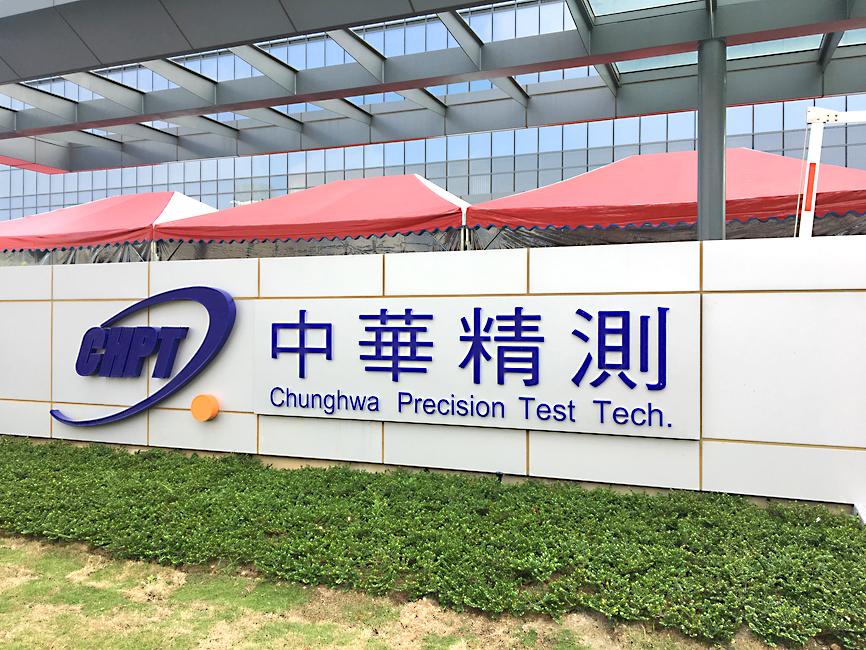Chunghwa Precision Test Technology Co (CHPT, 中華精測), which provides wafer and chip testing services, yesterday reported that net profit last quarter jumped 90 percent from a year earlier due to growing demand for application processors used in 5G applications.
5G technology would be a major growth driver for the company’s business and the global semiconductor industry in the next few years, CHPT said.
The company in February told investors that it had not seen customers delaying 5G deployment due to the COVID-19 outbreak.

Photo: CNA
First-quarter net profit soared to NT$179 million (US$5.95 million) from NT$94 million in the same period last year, a company statement said.
That was also up 7.8 percent from NT$166 million in the final quarter of last year.
Earnings per share jumped to NT$5.46 from NT$2.87 a year earlier and NT$5.06 in the previous quarter.
Gross margin improved to 52.6 percent last quarter from 50.6 percent a year earlier, but was down from 53.7 percent in the previous quarter.
Revenue surged 48.51 percent year-on-year to NT$900 million from NT$606 million.
By segment, application processors remained its biggest revenue source, contributing 57.3 percent to last quarter, up from 53.2 percent a year earlier.
The company made progress in expanding its new vertical probe card (VPC) service last quarter, with a revenue share of 26 percent, up from 4 percent a year earlier.
CHPT expects VPC to be a major growth driver this year after landing orders last year from a first-tier client to test application processors for mobile phones.
The COVID-19 pandemic has not affected the company’s operations and financial performance, it said, adding that all of its employees at home and overseas are healthy.
No infections have been reported, it said.
CHPT said it is building up inventories of key components and materials to avoid potential supply disruptions arising from broader containment measures and transportation restrictions.
The company is to give its business outlook at an investors’ conference today.

UNCERTAINTY: Innolux activated a stringent supply chain management mechanism, as it did during the COVID-19 pandemic, to ensure optimal inventory levels for customers Flat-panel display makers AUO Corp (友達) and Innolux Corp (群創) yesterday said that about 12 to 20 percent of their display business is at risk of potential US tariffs and that they would relocate production or shipment destinations to mitigate the levies’ effects. US tariffs would have a direct impact of US$200 million on AUO’s revenue, company chairman Paul Peng (彭雙浪) told reporters on the sidelines of the Touch Taiwan trade show in Taipei yesterday. That would make up about 12 percent of the company’s overall revenue. To cope with the tariff uncertainty, AUO plans to allocate its production to manufacturing facilities in

TAKING STOCK: A Taiwanese cookware firm in Vietnam urged customers to assess inventory or place orders early so shipments can reach the US while tariffs are paused Taiwanese businesses in Vietnam are exploring alternatives after the White House imposed a 46 percent import duty on Vietnamese goods, following US President Donald Trump’s announcement of “reciprocal” tariffs on the US’ trading partners. Lo Shih-liang (羅世良), chairman of Brico Industry Co (裕茂工業), a Taiwanese company that manufactures cast iron cookware and stove components in Vietnam, said that more than 40 percent of his business was tied to the US market, describing the constant US policy shifts as an emotional roller coaster. “I work during the day and stay up all night watching the news. I’ve been following US news until 3am

COLLABORATION: Given Taiwan’s key position in global supply chains, the US firm is discussing strategies with local partners and clients to deal with global uncertainties Advanced Micro Devices Inc (AMD) yesterday said it is meeting with local ecosystem partners, including Taiwan Semiconductor Manufacturing Co (TSMC, 台積電), to discuss strategies, including long-term manufacturing, to navigate uncertainties such as US tariffs, as Taiwan occupies an important position in global supply chains. AMD chief executive officer Lisa Su (蘇姿丰) told reporters that Taiwan is an important part of the chip designer’s ecosystem and she is discussing with partners and customers in Taiwan to forge strong collaborations on different areas during this critical period. AMD has just become the first artificial-intelligence (AI) server chip customer of TSMC to utilize its advanced

Six years ago, LVMH’s billionaire CEO Bernard Arnault and US President Donald Trump cut the blue ribbon on a factory in rural Texas that would make designer handbags for Louis Vuitton, one of the world’s best-known luxury brands. However, since the high-profile opening, the factory has faced a host of problems limiting production, 11 former Louis Vuitton employees said. The site has consistently ranked among the worst-performing for Louis Vuitton globally, “significantly” underperforming other facilities, said three former Louis Vuitton workers and a senior industry source, who cited internal rankings shared with staff. The plant’s problems — which have not